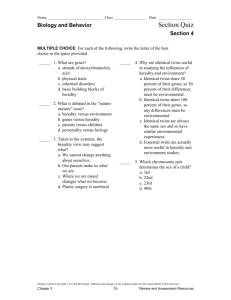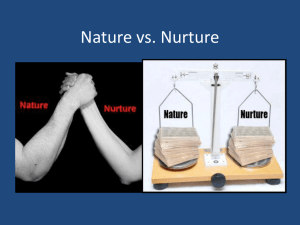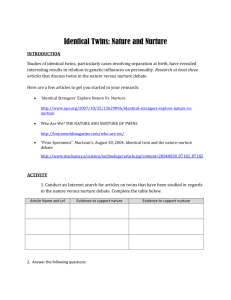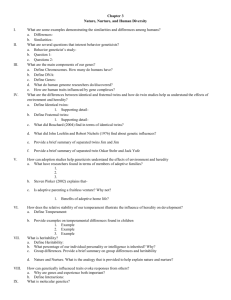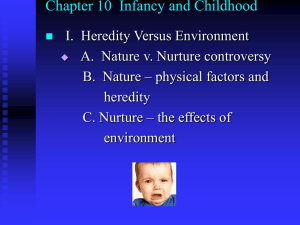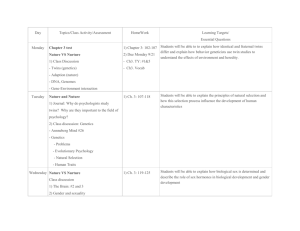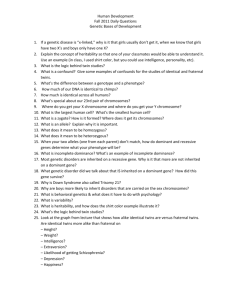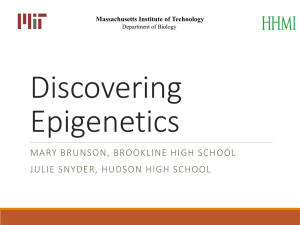Unit Eight Book 3 Nature and Nurture
advertisement
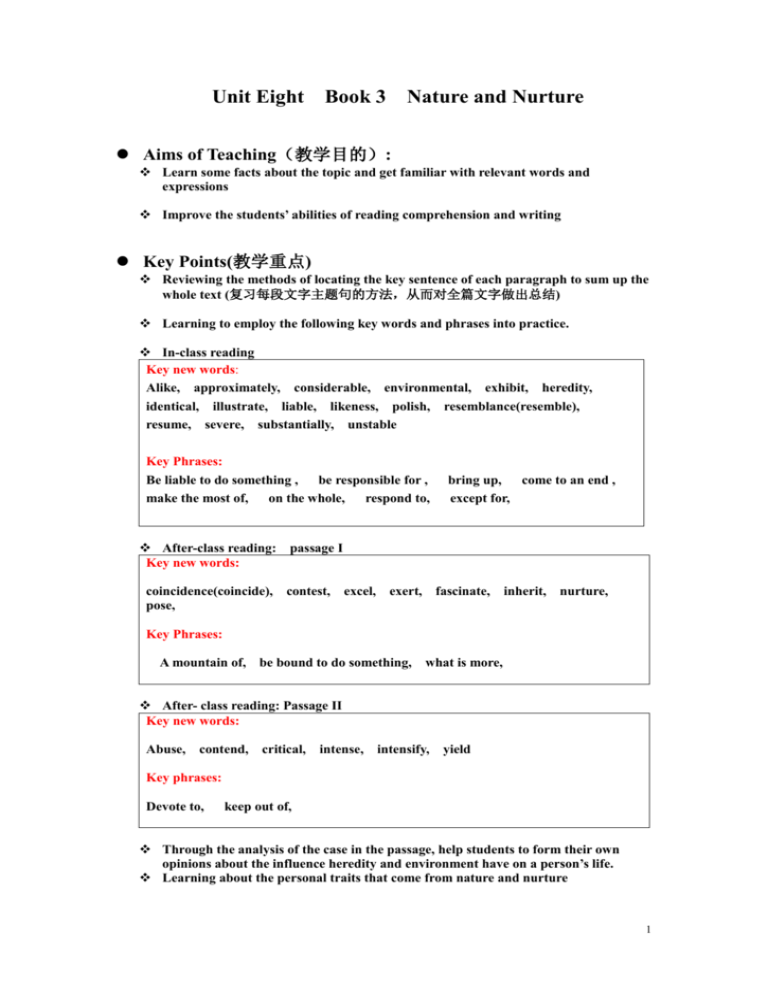
Unit Eight Book 3 Nature and Nurture Aims of Teaching(教学目的): Learn some facts about the topic and get familiar with relevant words and expressions Improve the students’ abilities of reading comprehension and writing Key Points(教学重点) Reviewing the methods of locating the key sentence of each paragraph to sum up the whole text (复习每段文字主题句的方法,从而对全篇文字做出总结) Learning to employ the following key words and phrases into practice. In-class reading Key new words: Alike, approximately, considerable, environmental, exhibit, heredity, identical, illustrate, liable, likeness, polish, resemblance(resemble), resume, severe, substantially, unstable Key Phrases: Be liable to do something , be responsible for , make the most of, on the whole, respond to, bring up, come to an end , except for, After-class reading: passage I Key new words: coincidence(coincide), contest, excel, exert, fascinate, inherit, nurture, pose, Key Phrases: A mountain of, be bound to do something, what is more, After- class reading: Passage II Key new words: Abuse, contend, critical, intense, intensify, yield Key phrases: Devote to, keep out of, Through the analysis of the case in the passage, help students to form their own opinions about the influence heredity and environment have on a person’s life. Learning about the personal traits that come from nature and nurture 1 Content and Time Distribution: 1. Period 1-2 Part 1( Preparation) and Part 2 ( In-class Reading: Pre-Reading) 2. Period 3-4 Part 2 (In-class Reading: Twins, Genes and Environment, Post-Reading) 3. Period 5-6 Part 2 ( After-class Reading: Science Looks Twice at Twins) Part 3 and Part 4 4. View, Listen and Speak (2 classes in Listening Lab) Methods of Teaching and Learning Tasks (教学方法及学习任务) Using multi-media teaching equipment Group-Work-Examine the cases in Exercise2 Page323 and decide which plays a decisive role in each case. Talk about the influence heredity and environment have on personal development according to respective situations of the students. Lesson Plan Part I Preparation: 1. Nature and Nurture: An Introduction "Nature and nurture" is the catchy and rather poetic term used to evoke the two main sources of factors that influence the physical, psychological and intellectual characteristics of any human being. "Nature", in this case, means everything a person inherits genetically. Originally, the verb "nurture" was chosen to describe the home environment and the influences parents had on their children. In a broader sense, "nurture" refers to the general social environment which includes such things as family influences, peer influences, and educational experiences. Over the years, various experiments and studies have been carried out in an effort to determine the relative importance of heredity and environment. Although it is fairly easy to see how our genetic make-up affects physical characteristics such as hair color, bone structure, and facial features, it is far more difficult to measure the impact of parental behavior on the development of personality of children, for example. One of the best-known studies on nature-nurture issues was carried out by scientists at the University of Minnesota. Their research on identical twins raised apart suggests that genes play a major role in shaping both personality and intelligence. Other studies have stressed the influence of parental verbal behavior on the intellectual development of children. In other words, the more parents talk with their children, the more they are likely to enhance their children's communication skills. A recent study carried out by the Colorado Adoption Project on a large number of adopted children has shown the preponderance of genetic inheritance with regard to personality and intelligence. Other studies have stressed the importance of factors outside the home, such as neighborhoods and one's peers. 2 The debate over the relative importance of genes and environment is likely to continue until additional major discoveries are made in the field of genetics. For the moment, common sense and personal experience tend to suggest that nature and nurture are both important, each having a greater or lesser effect, depending both on the complexity of the gene and the conditions of the environment. 2. Nature, Nurture or Both Work in groups to explain whether it is nature, nurture or both that play a dominating part in each case. Part II In-Class Reading Twins, Genes and Environment I. Work in groups to answer the following questions. 1. Many identical twins are much alike in both appearance and behavior, even when raised apart. Does it suggest that the genes play a more important role in one’s development? No, it only suggests the power of the genes and the limitation of the effect of environment. In the study, these identical twins were raised in the same physical environment. Even when raised apart, they were put in homes with a similar background. Therefore, it’s not surprising that these twins developed similarly. 2. Could you describe the difference between Helen and Gladys? Helen was confident, graceful, made the most of her personal appearance, and showed considerable polish and ease in social relationships. Gladys was shy, self-conscious, quiet and without charming or graceful manners. These differences were associated with the different social lives they had had. 3. Why did one scientist say their contrast should be effective as an ad for college education? That scientist’s remark told us that it was college education that distinguished Helen from Gladys. Helen had graduated from college and had been a teacher for twelve years, while Gladys didn’t even complete her primary study. Her formal education came to an end when she was in Grade three. 4. In your opinion, which plays more important role in the development of identical twins, genes or environment? I think both of them are very important and they have interacting influence on the development of the identical twins. Genes alone are never responsible for any traits as well as the environment. II. Language Points of In-class Reading 1. … we see that there can be no development without the interacting environment. (Line 4) 本句中 no + NP + without 构成双重否定,表达肯定意义。其中 no 修饰的名词短语可作主 3 语。 Example: 1)In some countries no major business is conducted without eye contact, requiring face-to-face conversation. 在有些国家里, 没有当面接触就做不成大生意, 需要面对面的交谈。 2)No other reproduction in any form is permitted without written permission from the publishing house. 未经出版社同意不得以任何形式进行复制。 3) one can read these microprints without a magnifying glass, a special glass that makes things look bigger. 没有放大镜,一种让东西显得大一些的特殊玻璃,谁也认不清这些印的极小的字体。 (译文……我们就会明白,没有与其相互作用的环境,就不可能有任何个人的发展。) 2. The relative effects of heredity and environment are most clearly observable in identical twins. (Line 7) The (relative) effects of … are (most clearly) observable. 效果/影响是显而易见的 ,完全可以看出……的影响 Example 1)The environmental effect of this new factory is most clearly observable in the surrounding field and river. 在周围的田地和河流中完全可以看到这个新工厂对环境的影响。 2) The effect of the bombs was most clearly observable in the face of men, women, and children. 这些炸弹影响的结果已非常清楚地写在这些男人、女人和孩子的脸上。 3)The effect of culture shock is most clearly observable in the unprepared visitors when they are involved in a strange culture. 当他们加入到一种陌生的文化中时,文化休克的结果在毫无准备的参观者身上极其显著。 (译文:遗传和环境的相对影响在同卵双胞胎中最易观察到。) 3.In a study … there were no more significant differences than existed among unseparated pairs of twins. (Line 21) “No more significant differences than existed”的完整形式是“No more significant difference than the differences that existed”。 no more…than 和……一样不;比……更不;非常不 no more than (=only) 不过,仅仅 Example: 1)He is no more a God than us. 他和我们一样不是上帝。 2)She hurried into the room with no more than a casual glance at the children standing outside. 她匆匆走进房间,对站在外面的孩子们只是漫不经心地瞟了一眼。 3) Money is no more than our servant. 金钱不过是我们的仆人。 4)No place in China can produce more memories of the beauty of your country than Guilin. 中国没有其它地方像桂林一样可以让人记住你们美丽的国家。 (译文……双胞胎之间的差异并不比一起长大的双胞胎之间的差异更显著。 ) 4 4.Important as they are, genes alone are never absolutely responsible for any trait. (Line 68) 这是 as 引导的让步状语从句,从句要倒装。 该句相当于:Though they are important… “形容词/副词/名词 + as / though + 主语 + 谓语”句型,引导让步状语从句。 Example 1)Poor as he was (though he was poor), he was honest. 2)Much as I admire him as a writer, I don’t like him as a man. 3)Teacher as he is, he cannot finish task in an hour. 4)Brave though they were, they had no chance of winning. (译文:尽管基因非常重要,但是基因本身决不能完全决定任何一个特点。 ) III. Words and Phrases 1.heredity (n.) (Line 1, Para 1) [U] the passing on of qualities from parent to child in the cells of the body 遗传;遗传性 e.g. 1)有些疾病是由于人居住的环境形成的,有些是遗传的缘故。 Some diseases develop because of the conditions one lives in; others are present by heredity. 2)有些孩子性情温和似乎是遗传所致。 Some children seem to be gentle by heredity. 词汇辨析 Compare: heritage, heredity and inheritance heritage 使 用 最 广 泛 , 不 仅 指 一 般 的 遗 产 , 也 指 世 代 相 传 的 具 有 特 色 的 精 神 财 富 或 物质财富。 heredity 特指生物遗传。 inheritance 指继承这一行为,不指继承的东西。为抽象名词。 请用 heritage, heredity 或 inheritance 填空。 1)公正比赛是我们的传统。 Fair play is part of our heritage. 2)他将从姑母那里继承来的财产捐给了当地孤儿院。 The estate he received by inheritance from his aunt was donated to the local orphanage. 3)我们的肤色取决于遗传。 The color of our skin is due to heredity. 2. interact (v.) (Line 5, Para. 1) (+ on / with) have an effect on each other or something else 互相作用,互相影响 e.g. 1)In international affairs, all countries are interrelated and interact on each other. 2) We college students should actively interact with the society. We college students should be in active interaction with the society. 3. identical (adj. no comp.) (Line 8, Para. 2) 1. ( + with / to) exactly alike 完全相同的,完全一样的 2. the same 同一的 5 请辨析下列句子中 identical 的含义。 1) No leaves are identical. (相同的) 2) This is the identical hotel that we stayed in last year. (同一的) e.g. 1)Your voice is identical to your brothers. You and your brother have almost identical voices. 2)Both events happened on the identical day. 4. resemblance (n.) (Line 16, Para. 3) the fact or an instance of being like or similar to another person or thing 相似,类似 resemble (v.) look or be like 像,似 e.g. 1)这对同卵双胞胎 (the identical twins) 长相相似但性格不同。 The identical twins resemble each other in appearance but not in character. 2)这个赝品(counterfeit)与徐悲鸿的真迹极其相似。 There is a strong resemblance between the authentic work of Xu Beihong and the counterfeit. 5. substantially (Line 27, Para. 4) substance (n.) 1. (C) a material; type of matter 物;物质 2. (the+, U) the important part; the real meaning 实质;本质;主旨;大意 请根据提示完成下面的对话。 1)Student A: What are they discussing? Student B: The substance of their discussion is how often and how long a student can surf on line. (他们讨论的主题) 2) Student: What is water? Teacher: Water is a substance vital to life. (生命必须的物质) substantial (adj.) 1. solid; strongly made 牢固的;结实的 2. noticeable; important; of some size or value 显著的;重要的;有价值的 substantially (adv.) quite a lot 相当大地 e.g. 1)尽管年轻,他已为这个工程作出了相当大的贡献。 Though young, he has substantially contributed to the project. 2)出国留学意味着在生活上作出重大改变。 To study abroad indicates to make substantial changes in life. 6.illustrate (v.) (Line 32, Para. 4) 1. (+ by / with) make the meaning (of something) clearer by giving related examples 阐明,说明 2. (+ with) put pictures in a book, article, etc. 给……作插图说明 请完成下面的句子。 1)他通过讲述自身的体验来阐明他的论点。 He illustrated his point by relating his own experience. 2)如果你给这本儿童读物配上插图,它就更畅销了。 If you illustrate this children book, it will sell much better. 6 近义词辨析 demonstrate 和 illustrate demonstrate 意为“示范;说明” 。通常通过动作示范来说明。 illustrate 通过给出实例、图表等来说明。 请用 demonstrate 或 illustrate 填空。 1)我们的工作人员会随时为您演示这台电脑的功能。 Our staff members are always ready to demonstrate how this computer works. 2)这些数据表明这台电脑性能良好。 The data illustrated that this computer worked well. 7. resume (v.) (Line 51, Para. 6) 1) start doing something again after stopping or being interrupted (中断之后)继续 2) take again 重新占用 请完成下面的句子。 1)失败后他很快就重振精神,投入新的工作。 He resumed his sprits and threw himself into the new work soon after the failure. 2)人们期望在交通高峰前恢复交通。 Traffic is expected to be resumed before the rush hour. 3)他的脸上很快就又露出自信的神情。 His face quickly resumed its confident expression. 4) 女士们,先生们,请回到原来的坐位。 Kindly resume your seats, ladies and gentlemen. 8. distinguish (v.) (Line 57, Para. 7) 1) hear, see, or recognize 辨认出;看清楚;听清楚 2) ( + from / between) make or recognize differences 辨别;区别; 3) behave (oneself) noticeably well 使出众,使扬名 e.g. 1)有时人们无法谨慎地区别事实和传言。 Every so often, people can not carefully distinguish between facts and rumors. 2)他在与美国的商业谈判中表现突出。 He distinguished himself in the commercial negotiation with America. 3)根据他的制服很容易把他辨认出来。 He is easily distinguished by his uniform. 词语辨析: distinguished (adj.) marked by excellent quality or deserved fame 著名 的,杰出的 distinguishable (adj.) that can be clearly seen, heard, or recognized as different 清晰可见的;可辨别的 请用 distinguished 或 distinguishable 填空。 A: Can you distinguish a BUICK LESABRE from other cars? B: Of course! Its exterior is rather distinguishable. What’s more, it is distinguished for its quality. 9. be liable to (Line 67, Para. 9) 1) 易于……的;有……倾向的;应受(处罚的);易遭;易患 2) + v. 容易做…… Translation: 7 1): No smoking, please! B: What if? A: Offenders are liable to fines of up to £100. (违者将处以最多可达 100 英镑的罚款。) 2): Ah, winter is coming! B: Poor Susan! She is liable to flu in winter. (她冬天易患流感。) A: So long it is not bird flu. 3) Human beings are liable to make mistakes under stress. 人类在压力之下容易犯错误。 10.exhibit (v.) (Line 67, Para. 9) 1) show a particular quality, feeling, or type of behavior 显示,展示 2) show something in a public place so that people can go to see it 展出,展览,陈列 请完成下面的句子。 1)Though not rich, he exhibited great concern for those homeless children and make whatever effort to help them. (显示极大关怀) 2) Manufacturers are exhibiting their new model cars. (展示新车模型) 3) He will exhibit his paintings before the public in New York. (在公众面前展出) IV. Try to identify the useful expressions in the text 1. 这对双胞胎成长的自然环境几乎相同。 The twins were raised in much the same physical environments. 2. 这对双胞胎在……方面及其相似。 The twins are remarkably alike in …. The twins maintain the closest resemblance to each other in …. 3. ……时有例外。 Exceptions occurred when …. 4. 双胞胎 / 一对双胞胎中的一个 / 两对双胞胎 / 同卵双胞胎 the twins / one twin / two sets of twins / identical twins 5. 患了相当严重的疾病 develop a rather severe illness 6. 相距甚远的两家 the two families far removed from each other 7. 海伦充分利用了她外表的优势。 Helen made the most of her personal appearance. 8. 海伦在社交中显得很从容、有修养。 Helen showed considerable polish and ease in social relationships. V. After-Class Reading Passage 1 Science Looks Twice at Twins Group work: To make a short presentation in the class after group discussion of any of the 8 following topics: 1) Do you agree that genes influence every aspect of a person’s behavior? 2) What causes the differences in our intelligence, talents, and taste? Are they largely determined by the genes we inherit? How much do our experience have to do with it? Passage 2 Talkative Parents Make Kids Smarter After reading the passage outside of the class, SS are supposed to finish Exe.3 on Page361 and express their own ideas on the same topic, and present in the class afterward. Part III Further Development 1. Enriching Your Word Power ( Aim: to help SS focus on the diversity of word meaning) Step 1 Group mates work together to get familiar with the information as quickly as possible in 5min. Prepare 5 question. Step 2. Group challenge. One group can challenge with any other group on the prepared questions. 2. Solving Teresa’s Dilemma Work in groups to solve Teresa’s dilemma by answering the questions that follow the description of her case.(optional) 3. Which Has a Stronger Influence, Heredity or Environment? Divide the class into two groups to debate which has a stronger influence, heredity or environment. The groups should give examples related to physical, intellectual and emotional characteristics, and try to find convincing points to support the arguments. Part IV View Listen & Speak Unit 1 BOOK 3 ( Listening Lab) Ss are supposed to finish as much as the activities in the book. Make sure that the effectiveness of Ss’ participation. 9
